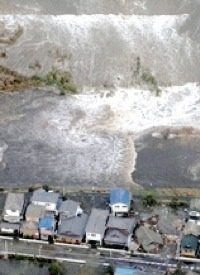
Japan’s earthquake caused the loss of the cooling systems of two nuclear reactors there. Currently, an emergency has been declared at the Fukushima Dai-Ichi reactor as hundreds of thousands are fleeing the area. Authorities have evacuated the area within a 12-mile radius of the reactor. Fears of a nuclear meltdown are escalating. Nevertheless, to date no Western-designed nuclear plant has ever had a lethal nuclear accident. (Chernobyl, in Russia, was an accident waiting to happen; the nuclear reactor was not even housed in a containment building.)
The tsunami was so destructive that it triggered whirlpools. Video footage captured a boat swirling in a massive eddy, and whether anyone was in the vessel remains unknown.
Whirlpools are common following tsnuamis, noted Ruth Ludwin, retired seismologist at the University of Washington in Seattle, who added:
Whirlpools have a big impact on the human imagination. They’re very notable and very frightening. But from the perspective of the geological record, they don’t leave any regular sign that has been recognized so far.
Naturally, Japanese Americans, particularly in regions such as Los Angeles and other areas with large Japanese-American populations, are struggling to make contact with their loved ones in the Pacific.
For example, Misa Washio, a clerk at a counter selling pens in a bookstore in New York City, reports, “I tried calling my sister in Japan, but all the phone lines were jammed. I tried about 10 times.”
According to president of the Japan America Society of Southern California Doug Erber, his office has been inundated with phone calls from Japanese Americans who are facing difficulty reaching loved ones. “The phone has not stopped ringing, and text messages and emails,” he commented. “It’s been a busy day just trying to keep up. I think I got about 45 minutes of sleep last night.”
Fortunately, Google released a person finder application for victims of the Japanese tsunami and earthquake. The company claims to have information regarding 7,200 people and indicates that all information is available to the public and viewable by anyone. Similar tools have been created by Google in response to natural disasters in Haiti, Chile, Pakistan, Brazil, and New Zealand.
Meanwhile, Americans have already proven themselves to be the charitable people for which they have gained a reputation. According to the American Red Cross website, there has been an “outpouring of support from the public in response to this event.” The Red Cross has been overwhelmed with requests from Americans who are seeking to volunteer for the Japanese relief efforts, though the Red Cross is not currently accepting those applications, since the Japanese Red Cross is reported to have “extraordinary response capabilities.”
However, American Red Cross chapters in the Pacific islands of Hawaii, Northern Mariana Islands, and Guam are on alert, while the American Red Cross in Kuala Lumpur, Malaysia is fully stocked with enough relief supplies to support for 5,000 families, with disaster specialists on standby.
As in the case of previous natural disasters, those interested in making $10 donations to the Red Cross for the Japanese relief efforts can text REDCROSS to 90999.




